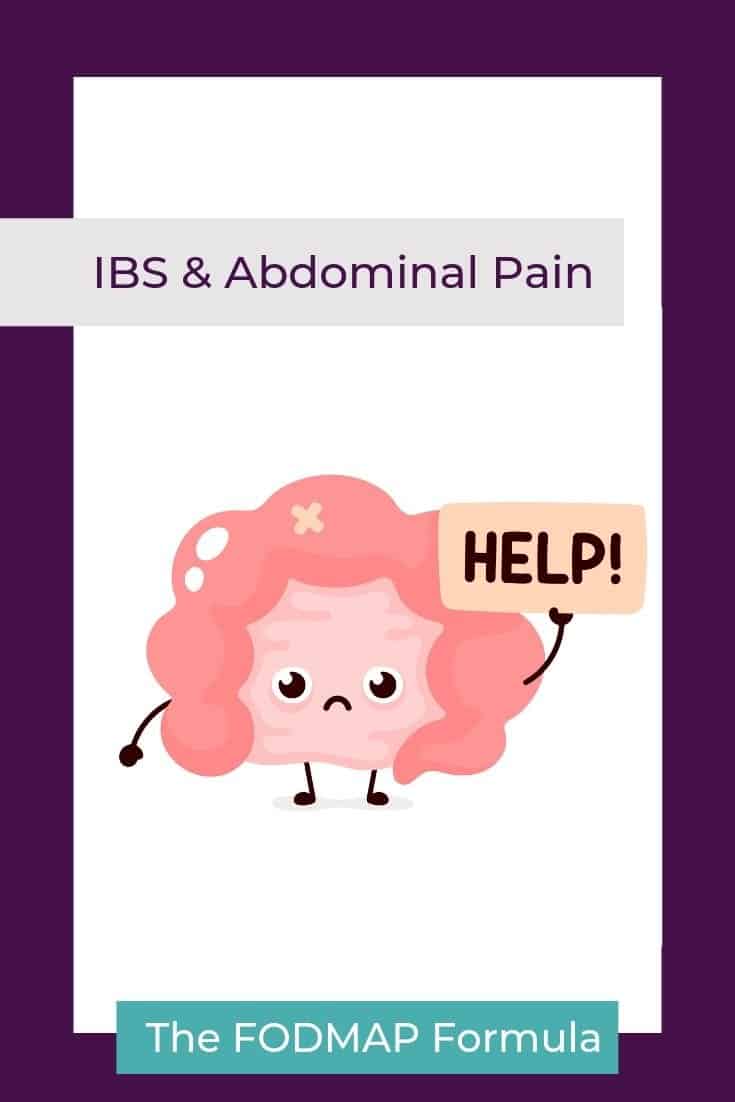Have you ever felt a sharp pain or cramp in your abdomen and wondered if it was caused by your IBS? You may be right! In this article, we’ll talk about what causes IBS-related abdominal pain. Grab your spectacles, friend! We’re about to get our nerd on!

Where Can You Experience Abdominal Pain?
The first thing you need to know is that when we talk about abdominal pain and its relation to symptoms of IBS, we’re talking about pain inside your abdominal cavity. This is the space between the bottom of your ribs and the top of your hips.
It might feel like a sharp, stabbing pain, a cramp, or a feeling of fullness or pressure. The pain may also come and go, be constant, or only happen in certain positions – like when you’re sitting or bending over, but it all counts.
Understanding Your Nervous System
To understand IBS-related abdominal pain, there are a few things you need to know about your nervous system. First of all, there are two different systems involved in this type of abdominal pain.
The Autonomic Nervous System or ANS collects information about the organs in your chest, abdominal, and pelvic cavity and delivers it to your brain. While the ANS can detect pain, it can’t pinpoint the location of the problem.
Your Somatic Nervous System or SNS collects information about your muscles, membranes, and skin. Unlike the ANS, the SNS can report the exact location where it feels pain. Like how your brain registers a papercut! #overachiever
What Causes IBS-Related Abdominal Pain?
So now that you’re more familiar with the systems we’re dealing with let’s talk about why you may experience pain. The stabbing feeling can be short or long term, and still be connected to symptoms of Irritable Bowel Syndrome, IBS.
There are a few things happening here. First of all, certain foods – like FODMAPs – can pull water into the intestine, create excess gas, and cause your gut muscles to spasm. If you suffer from constipation, poop can also build up in your intestines. All of these things can cause your intestines to swell up. While that’s technically their job, sometimes the intestine stretches a little too much for comfort. When this happens, your gut sends a message to the brain, saying it’s in pain.
But, since the Autonomic Nervous System can’t tell your brain exactly where it’s hurting, the pain may translate into a feeling of pressure/fullness in your abdomen, or you may generally feel under the weather.
If, however, your intestine swells enough to make contact with the abdominal wall, the Somatic Nervous System will send the exact location to your brain (like GPS coordinates).
Your brain takes the information it receives from both the ANS and the SNS and does its best to piece together what’s happening. In the case of IBS-related abdominal pain, your brain attributes the pain in your entire digestive tract to the spot it can identify (ouch!).
While this all sounds super nifty, there are many reasons you may experience abdominal pain. So never assume pain is from IBS. If you’re experiencing abdominal pain for the first time, experiencing more pain than usual, the pain isn’t going away, having trouble breathing, or have a fever, always seek medical attention. (Dr. Google doesn’t count!)

Final Thoughts
Abdominal pain is a common issue in the IBS community. To recap, the intestines can feel pain, but they can’t pinpoint the location. But, when the intestine swells enough to tap the abdominal wall, which can pinpoint location, the brain attributes the pain of the entire digestive tract to the spot it can identify.
Remember, there are lots of reasons you may experience abdominal pain. So always check in with your healthcare team if you’re experiencing pain for the first time, if it feels different than usual, or if you have a fever. It’s important that you get the proper medical advice for a diagnosis or treatment for IBS.
You might also like one of these:
What Is Irritable Bowel Syndrome Wondering if your digestive issues add up to IBS? Check out this article for everything you need to know about irritable bowel syndrome!
Is Your Gluten Sensitivity Really An Intolerance to Fructans? Gluten isn’t the only thing in your grains that can turn your tummy! Check out this article to understand the difference between gluten and fructan sensitivity and how to find out which one you’re actually reacting to.
Can Food Sensitivity Tests Identify IBS Food Triggers? Wondering if a food sensitivity test can help you identify your IBS triggers? Here’s everything you need to know about food sensitivity tests and what they mean for people with IBS.
If you like this post, don’t forget to share it! If you like this post, don’t forget to share it! Follow me on Instagram @fodmapformula for more FODMAP friendly tips and recipes! Together we’ll get the low FODMAP diet down to a science!

